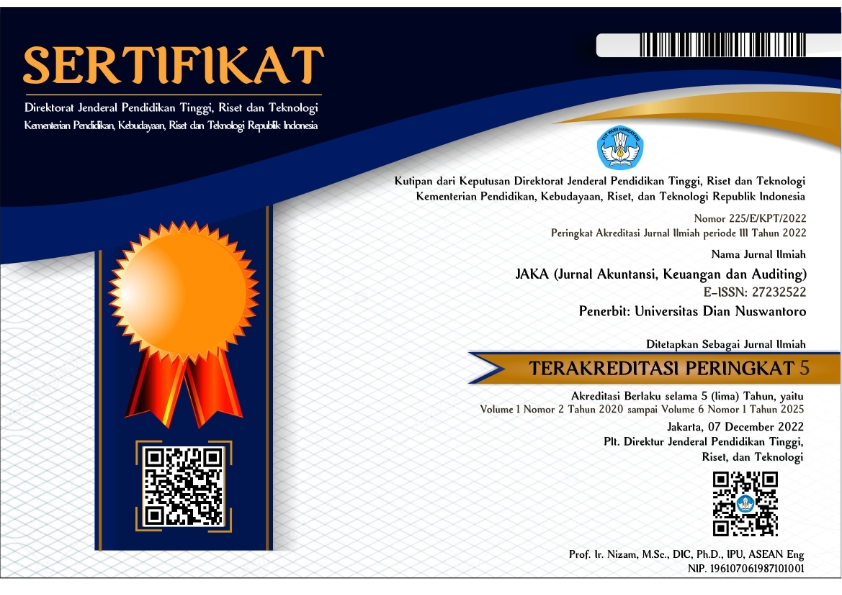PENGARUH PEMAHAMAN RED FLAG TERHADAP DETEKSI KECURANGAN DENGAN PENGALAMAN AUDITOR SEBAGAI VARIABEL MODERASI
DOI:
https://doi.org/10.56696/jaka.v4i1.8304Abstract
The purpose of this research is to investigate the impact of red flags on fraud detection, the impact of auditor experience on fraud detection, and the capacity of auditor experience to mitigate the impact of red flags on fraud detection. This study's sample included 57 auditors from the Central Java Provincial Regional Inspectorate. This is quantitative research. Partial Least Squares (PLS) analysis is utilized for data analysis, and SmartPLS software is employed. According to the study's findings, red flags have a strong positive influence on fraud detection, auditor experience has a significant effect on fraud detection, and auditor experience cannot attenuate the effect of comprehending red flags on fraud detection.References
Andriyanti, D., & Latrini, M. Y. (2019). Pengaruh Pengalaman, Independensi, dan Profesionalisme Auditor Internal Dalam Mencegah Kecurangan Pada Bank Perkreditan Rakyat. E-Jurnal Akuntansi, 27(1), 475–504. https://doi.org/10.24843/eja.2019.v27.i01.p18
Arens, A. A., Elder, R. J., & Beasley, M. S. (2008). Auditing dan Jasa Assurance (12th ed.). Erlangga.
Dasila, R. A., & Hajering, H. (2019). Pengaruh Pengalaman, Independensi dan Skeptisme Profesional Auditor Terhadap Pendeteksian Fraud. PARADOKS: Jurnal Ilmu Ekonomi, 2(1), 61–80.
Duffield, G., & Grabosky, P. (2001). The Psychology of Fraud. Trends and Issues in Crime and Criminal Justice, 1.
Fullerton, R., & Durtschi, C. (2011). The Effect of Professional Skepticism on the Fraud Detection Skills of Internal Auditors. SSRN Electronic Journal, 435. https://doi.org/10.2139/ssrn.617062
Ghozali, I., & Latan, H. (2015). Konsep, Teknik, Aplikasi Menggunakan Smart PLS 3.0 Untuk Penelitian Empiris. BP Undip.
Guelpa, A., Marini, F., du Plessis, A., Slabbert, R., & Manley, M. (2017). Verification of authenticity and fraud detection in South African honey using NIR spectroscopy. Food Control, 73, 1388–1396. https://doi.org/10.1016/J.FOODCONT.2016.11.002
Gullkvist, B., & Jokipiii, A. (2015). Factors influencing auditors’ self-perceived ability to assess fraud risk. Nordic Journal of Business, 64(1), 40–63.
Hegazy, M., & Kassem, R. (2010). Fraudulent financial reporting: Do red flags really help. Journal of Economics and Engineering, 4, 69–79.
Jaffar, N., Haron, H., Mohd Iskandar, T., & Salleh, A. (2011). Fraud Risk Assessment and Detection of Fraud: The Moderating Effect of Personality. International Journal of Business and Management, 6(7), 40–50. https://doi.org/10.5539/ijbm.v6n7p40
Januarti, I. (2011). Analisis Pengaruh Pengalaman Auditor, Komitmen Profesional, Orientasi Etis dan Nilai Etika Organisasi Terhadap Persepsi dan Pertimbangan Etis (Auditor Badan Pemeriksa Keuangan Indonesia). Simposium Nasional Akuntansi XIV Aceh 2011, 1–37.
Kartikarini, N., & Sugiarto. (2016). Pengaruh Gender, Keahlian, dan Skeptisisme Profesional terhadap Kemampuan Auditor Mendeteksi Kecurangan. Simposium Nasional Akuntansi XIX.
Kassem, R., & Higson, A. (2012). The New Fraud Triangle Model. Journal of Emerging Trends in Economics and Management Sciences, 3(3), 191–195. https://doi.org/10.10520/EJC132216
Kelley, H. H. (1973). The processes of causal attribution. American Psychologist, 28(2), 107–128. https://doi.org/10.1037/H0034225
Kiswanto, & Maulana, P. A. (2019). Pengalaman Memoderasi Penilaian Resiko Kecurangan, Skeptisisme, Beban Kerja pada Kemampuan Mendeteksi Kecurangan. Jurnal Ilmiah Akuntansi Dan Bisnis, 14(2), 183–195.
Knapp, C. A., & Knapp, M. C. (2001). The effects of experience and explicit fraud risk assessment in detecting fraud with analytical procedures. Accounting, Organizations and Society, 26(1), 25–37. https://econpapers.repec.org/RePEc:eee:aosoci:v:26:y:2001:i:1:p:25-37
Kurniawan, A. (2018). Metodologi Penelitian Pendidikan (1st ed.). Remaja Rosdakarya.
Larasati, D., & Puspitasari, W. (2019). Pengaruh Pengalaman, Independensi, Skeptisisme Profesional Auditor, Penerapan Etika, Dan Beban Kerja Terhadap Kemampuan Auditor Dalam Mendeteksi Kecurangan. Jurnal Akuntansi Trisakti, 6(1), 31–42. https://doi.org/10.25105/jat.v6i1.4845
Mustika, D. (2016). Analisis Faktor-Faktor yang Mempengaruhi Kecenderungan Kecurangan (Fraud): Persepsi Pegawai Dinas Kabupaten Way Kanan Lampung. Simposium Nasional Akuntansi XIX, Lampung, 1–22. http://lib.ibs.ac.id/materi/Prosiding/SNA XIX (19) Lampung 2016/makalah/006.pdf
Nair, P., & Kamalanabhan, T. J. (2011). Predicting unwillingness to report ethical infractions of peers: A moderated mediation approach. IIMB Management Review, 23(2), 81–90. https://doi.org/10.1016/j.iimb.2011.02.001
Okpianti, C. N. (2016). Pengaruh Pengalaman Auditor, Etika Profesi dan Tipe Kepribadian Terhadap Skeptisisme Profesional Auditor dan Kemampuan Auditor dalam Mendeteksi Kecurangan (Studi Empiris pada KAP di Yogyakarta, Solo dan Semarang). http://repository.umy.ac.id/handle/123456789/8234
Prasetyo, D. A., & Darmayanti, N. P. A. (2015). Pengaruh Risiko Kredit, Likuiditas, Kecukupan Modal, Dan Efisiensi Operasional Terhadap Profitabilitas Pada Pt Bpd Bali. E-Jurnal Manajemen Universitas Udayana, 4(9), 2590–2617.
Pratama, N. A., Sukarmanto, E., & Purnamasari, P. (2019). Pengaruh Red Flags dan Whistleblowingsystem terhadap Kemampuan Auditor dalam Mendeteksi Kecurangan (Fraud) (Studi Empiris pada BUMN di Kota Bandung). Prosiding Akuntansi; Vol 5, No 1, Prosiding Akuntansi (Februari, 2019); 22-27. http://repository.unisba.ac.id:8080/xmlui/handle/123456789/24624
Rumengan, I. P. E., & Rahayu, S. (2014). Pengaruh Kompetensi, Independensi Dan Pengalaman Kerja Terhadap Kualitas Audit (Survei Terhadap Auditor Kap Di Bandung). EProceedings of Management, 1(3). https://openlibrarypublications.telkomuniversity.ac.id/index.php/management/article/view/3300
Salem, M. S. (2012). An overview of research on auditor’s responsibility to detect fraud on financial statements. Journal of Global Business Management, 8(2), 218.
Sanjaya Adi Putra, G., & Dwirandra, A. A. N. B. (2019). The effect of auditor experience, type of personality and fraud auditing training on auditors ability in fraud detecting with professional skepticism as a mediation variable. International Research Journal of Management, IT and Social Sciences, 6(2), 31–43. https://doi.org/10.21744/irjmis.v6n2.604
Segah, B. (2018). Pengaruh Pengalaman Kerja, Independensi, Objektivitas, Dan Motivasi Terhadap Kualitas Hasil Pemeriksaan Auditor Inspektorat Provinsi Kalimantan Tengah. Anterior Jurnal, 17(2), 86–99. https://doi.org/10.33084/anterior.v17i2.8
Setiawan, L., & Fitriany, F. (2011). Pengaruh Workload Dan Spesialisasi Auditor Terhadap Kualitas Audit Dengan Kualitas Komite Audit Sebagai Variabel Pemoderasi. Jurnal Akuntansi Dan Keuangan Indonesia, 8(1), 36–53. https://doi.org/10.21002/jaki.2011.03
Suartana, I. W. (2010). Akuntansi Keperilakuan Teori dan Implementasi. Andi Offset.
Tuanakotta, T. M. (2012). Akuntansi Forensik dan Audit Investigatif. Salemba Empat.
Widyastuti, T. (2009). Pengaruh Struktur Kepemilikan Dan Kinerja Keuangan Terhadap Manajemen Laba: Studi Pada Perusahaan Manufaktur Di BEJ. MAKSI, 9, 30–41.
Zimbelman, M. F., Albrecht, C. O., Albrecht, C. C., & Albrecht, W. S. (2017). Akuntansi Forensik (4th ed.). Salemba Empat.
Downloads
Published
How to Cite
Issue
Section
License
Copyright (c) 2023 JAKA (Jurnal Akuntansi, Keuangan, dan Auditing)

This work is licensed under a Creative Commons Attribution-ShareAlike 4.0 International License.












